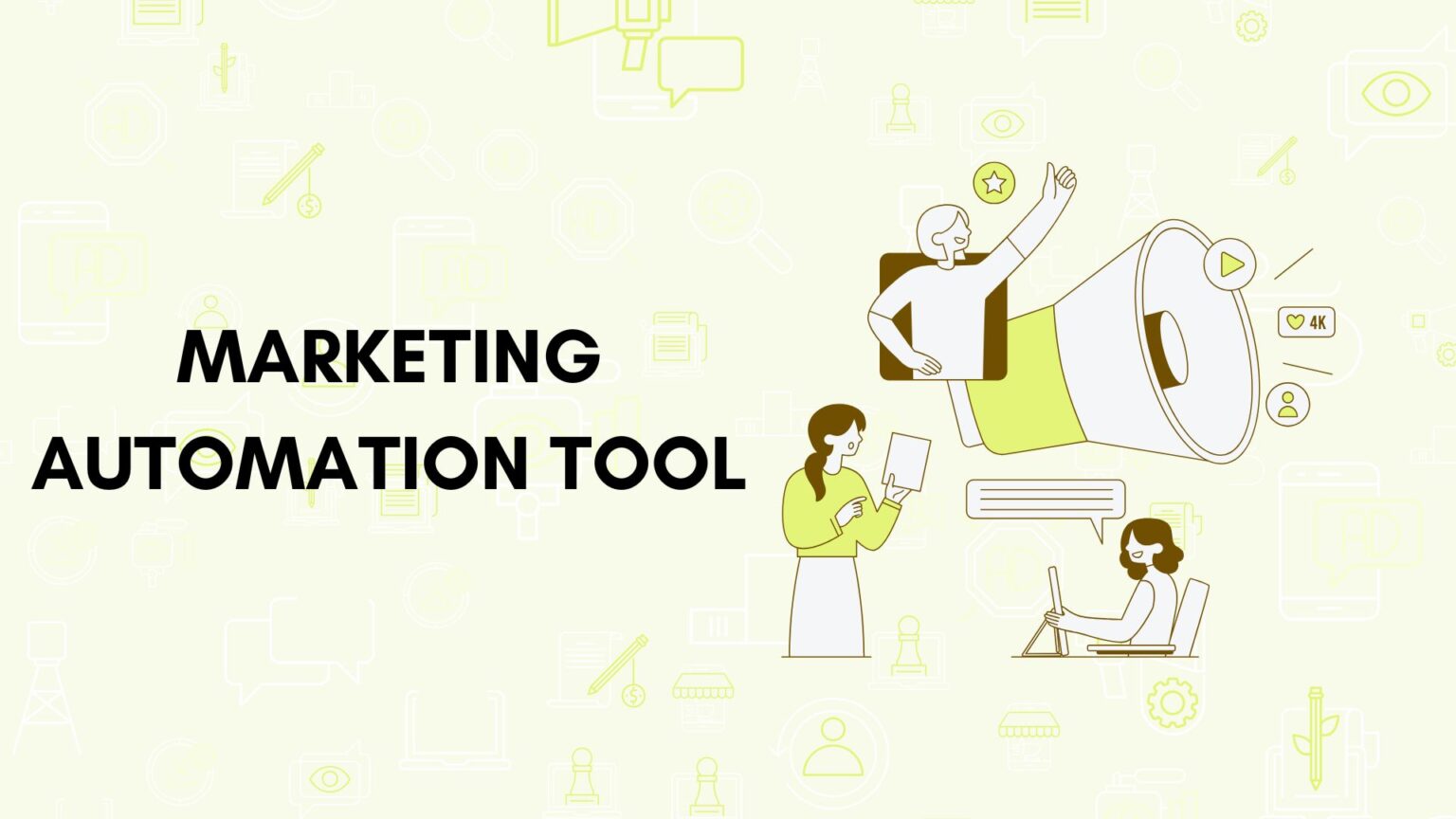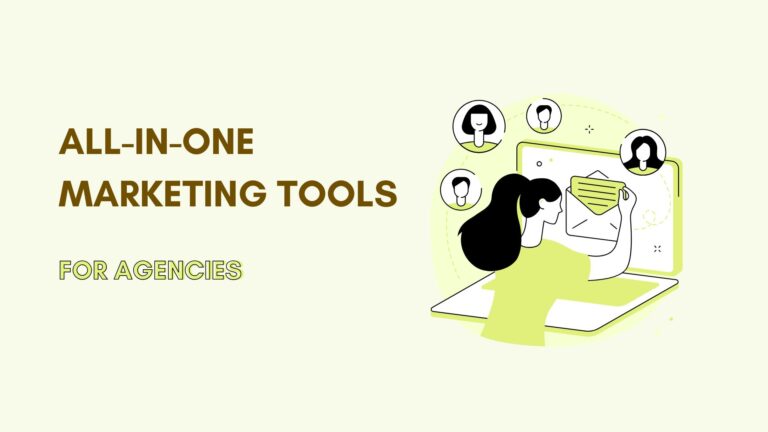If you’d like to explore the different ways to streamline your marketing efforts, we’ve rounded up some of the best marketing automation tools worth trying right now. In this guide, you’ll find options for small teams, as well as enterprise-level platforms packed with advanced features. There’s a tool here to fit your needs.
1. HubSpot Marketing Hub
HubSpot is often at the top of the list when people talk about the best all-in-one marketing platforms.
From AI-powered lead nurturing and email campaigns to predictive analytics and cross-channel personalization, the software helps marketers cut down manual tasks while boosting conversion rates.
If you’ve been on the hunt for a marketing automation tool that actually does more than send emails, HubSpot Marketing Hub is a good choice. It’s a full ecosystem built around HubSpot’s CRM. Your campaigns, lead data, and reporting all live in one place.
For starters, the drag-and-drop editor makes creating emails, landing pages, and CTAs ridiculously easy. You can also build out entire nurturing workflows that trigger automatically based on visitor behavior. Speaking of scoring, HubSpot’s lead scoring system and AI-powered recommendations are super useful.
For one thing, with the cross-channel campaign management, you can run social posts, ads, and blog content all from the same dashboard.
Besides, HubSpot has been layering in AI tools like an AI email writer, predictive analytics, and even AI agents (like the Breeze Customer Agent) that can engage visitors 24/7.
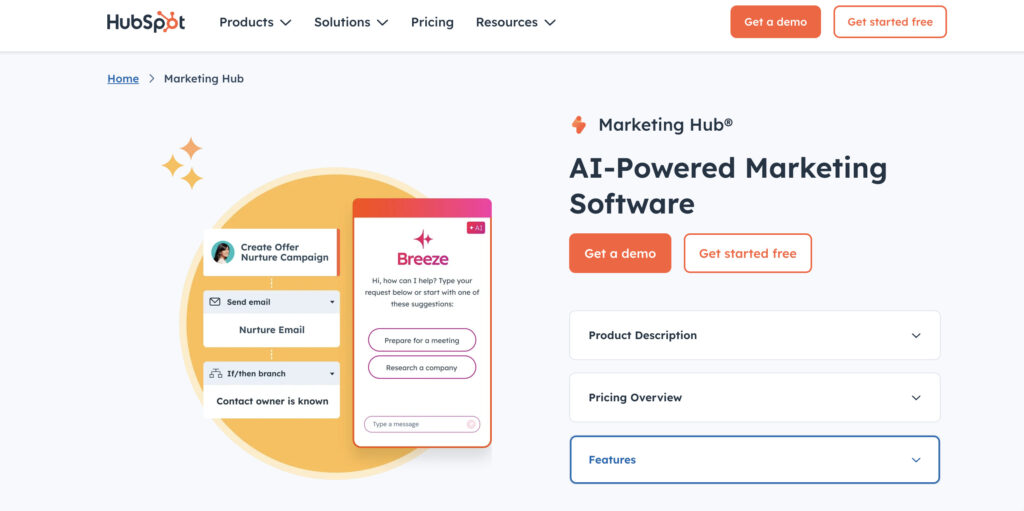
Pros
- All-in-one platform with built-in CRM
- Intuitive drag-and-drop editors
- Powerful automation for email and more
- Strong inbound marketing focus with SEO, blogging, and social tools
- Robust reporting and dashboards
- Large app marketplace for integrations
Cons
- The Starter plan is limited
- Can feel overwhelming for beginners
- Difficult to migrate away once fully invested in the ecosystem
Read more Top 10 Best CRM Tools for SaaS Startups
2. ActiveCampaign
It’s a great time to take a look at ActiveCampaign, especially since the platform has rolled out a wave of new AI features.
ActiveCampaign is one of the automation platforms built for marketers. It combines a powerful automation engine with a conversational AI layer they call Active Intelligence. Instead of just scheduling tasks or drip campaigns, it actually suggests your “next best move” based on your data and goals.
The visual automation builder lets you map out complex customer journeys with triggers, conditions, and split branches. In addition, the cross-channel reach is excellent. You can manage emails, SMS, WhatsApp, and social messaging campaigns right from the same platform.
So if you’re looking for a tool that actually helps you strategize, execute, and optimize campaigns across multiple channels, ActiveCampaign is definitely a good option.
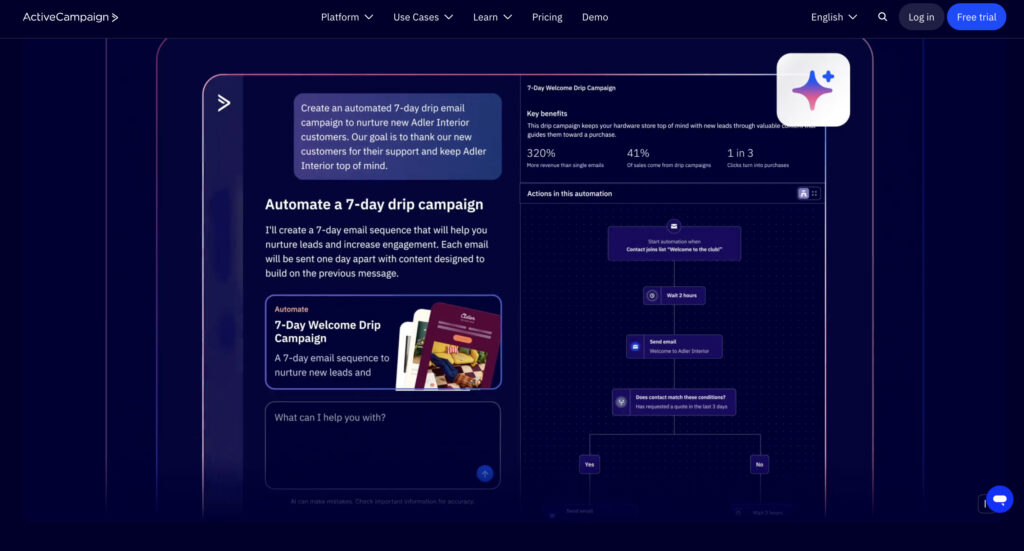
Pros
- Powerful visual automation builder
- Strong email marketing with advanced segmentation
- Built-in CRM and sales automation
- Multi-channel marketing (email, SMS, WhatsApp, social)
- High email deliverability rates
Cons
- The learning curve
- No permanent free plan, only a 14-day trial
- Forms and landing pages are pretty basic
- Limited A/B testing
3. Klaviyo
We’ve also included plenty of details on Klaviyo in this guide. If you’re running an e-commerce brand, it’s hard not to consider Klaviyo. The platform is built specifically for B2C.
Klaviyo integrates with platforms like Shopify and WooCommerce. With that real-time data flow, you can build campaigns that react to customer behavior.
The visual flow builder is also one of our favorite parts. You can easily grab pre-built flows like welcome series or win-back campaigns and get them live. And if you want to get more advanced, the segmentation and predictive analytics open up a whole new level of personalization.
Klaviyo also does a great job at email and SMS together. You can manage both channels in one place, which makes building a cohesive strategy way easier.
If your business is e-commerce-first, Klaviyo is definitely worth shortlisting.
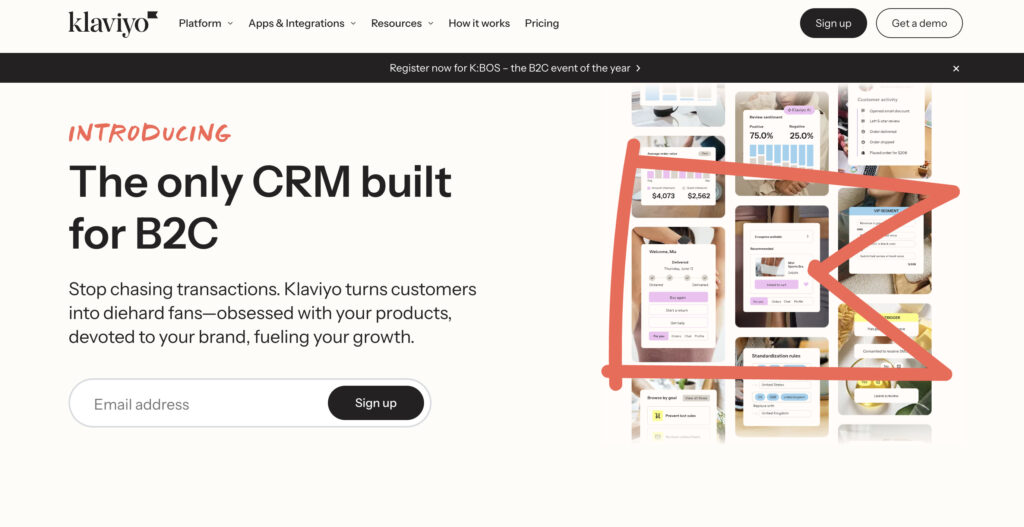
Pros
- Advanced segmentation for highly personalized campaigns
- Deep integrations with Shopify, WooCommerce, and BigCommerce
- Pre-built automation flows
- Support for both email and SMS marketing
- Detailed analytics
Cons
- Email editor has limited customization
Expert opinion
Good marketing makes the company look smart. Great marketing makes the customer feel smart.

Operating Partner at Battery Ventures
4. Brevo
Yes! In fact, Brevo (formerly Sendinblue) has one of the most generous free plans. Brevo might not have the fanciest analytics or the deepest app marketplace, but for SMBs, it’s one of the best options out there for multi-channel marketing.
The platform itself is clean and easy to use. The visual workflow builder is really straightforward for setting up welcome emails and simple nurture sequences.
Beyond email, Brevo includes SMS, WhatsApp, and a built-in CRM. And if you’re a developer or run an e-commerce store, the transactional email API is rock-solid for order confirmations or shipping updates.
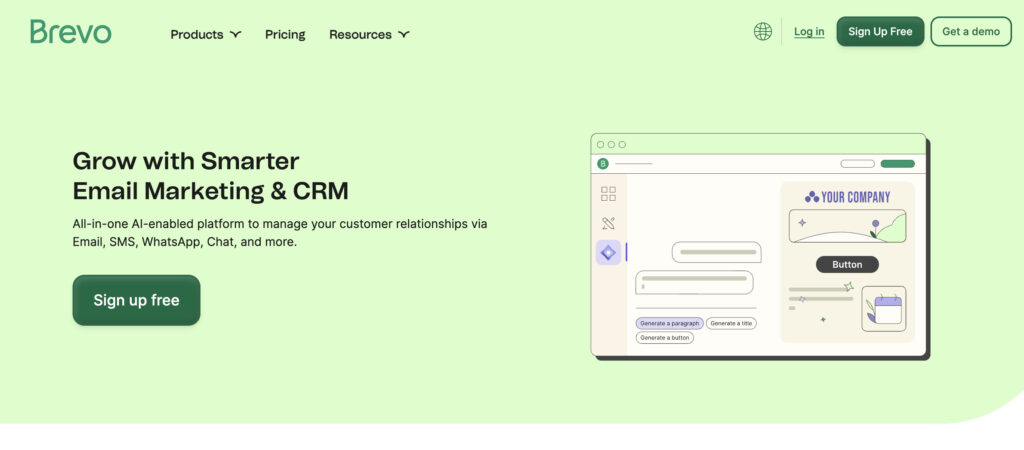
Pros
- Affordable pricing
- Multi-channel support
- Beginner-friendly interface
- Built-in CRM for managing contacts and pipeline
- Free plan included (300 emails/day)
Cons
- Landing page builder is basic and only available on higher plans
- Smaller integration marketplace
5. Mailchimp
If you’re on a budget and looking for a user-friendly way to start with email marketing, Mailchimp is one of the easiest tools to recommend. It’s built a reputation on simplicity. The drag-and-drop editor, clean dashboard, and ready-made templates make it quick to send out professional-looking campaigns.
With Mailchimp appealing, you can manage a decent-sized list and send campaigns. As your needs grow, Mailchimp also has advanced segmentation, generative AI tools, reporting, and extras like landing pages and social ads baked in. It’s essentially an all-in-one platform.

Pros
- Extremely beginner-friendly
- A wide range of templates and essential email tools
- Wide integrations
- Expanding features beyond email (landing pages, ads, social)
Cons
- Limited automation features on lower-tier plans
- Workflow builder is less powerful
- Basic landing pages and forms
6. Omnisend
If you’re running an online store, Omnisend really stands out as a marketing automation platform built specifically for e-commerce.
As always, the best way to get the most value out of Omnisend is to lean into its email + SMS automation together. The workflows are already tailored for stores. Things like abandoned cart reminders, product recommendations, and post-purchase follow-ups come pre-built.
Omnisend includes some clever interactive features like scratch cards, gift boxes, and “Wheel of Fortune” forms that make sign-ups and campaigns feel more engaging. It’s also incredibly straightforward to use, with customizable templates.

Pros
- Omnichannel automation
- Seamless e-commerce integrations (Shopify, WooCommerce, BigCommerce)
- Pre-built workflows
- Interactive features (scratch cards, spin-to-win forms, gamified popups)
- Clear, affordable pricing structure
Cons
- Landing page builder lacks deep customization
- Reporting and analytics are not very advanced
Lead quantity increases by 80% for those using marketing automation. Marketing automation can cut marketing overhead by 12.2% (Source: Oracle). The central purpose of marketing automation tools is to streamline repetitive tasks and, in doing so, enable a more personalized and efficient customer journey. Key features include email marketing automation (welcome emails, drip campaigns), lead scoring and nurturing, and customer segmentation.
Conclusion
There are plenty of other good options, and the right marketing automation tool really depends on your goals and budget. Test a few of these tools to find the perfect match to streamline your workflows.
Frequently Asked Questions


